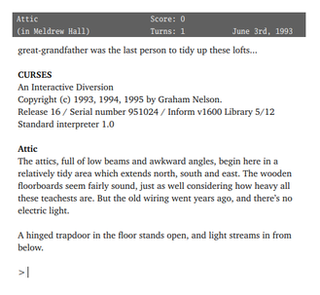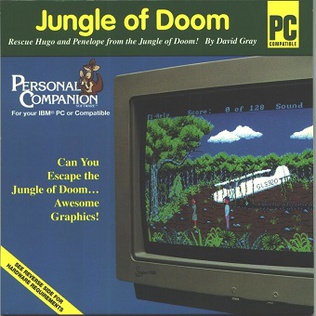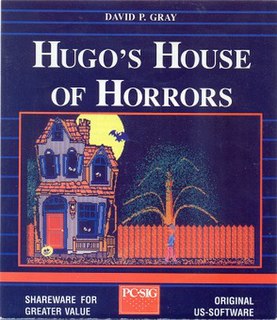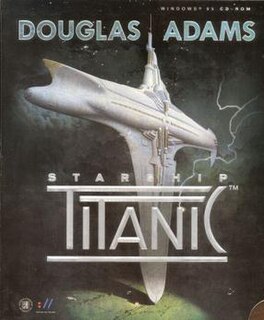 W
WAisle is a 1999 interactive fiction video game whose major innovation is to allow only a single move and offer from it over a hundred possible outcomes. It is notable for introducing and popularizing the one move genre.
 W
WAnchorhead is a Lovecraftian horror interactive fiction game, originally written and published by Michael S. Gentry in 1998. The game is heavily inspired by the works and writing style of H.P. Lovecraft, particularly the Cthulhu mythos.
 W
WCurses is an interactive fiction computer game created by Graham Nelson in 1993. Appearing in the beginning of the non-commercial era of interactive fiction, it is considered one of the milestones of the genre.
 W
WThe Cypher is an interactive fiction video game by EPG Media Inc.
 W
WDracula Hakushaku (ドラキュラ伯爵) is a 1992 Japan-exclusive text adventure video game released for the NEC PC-9801, Sharp X68000 and FM Towns.
 W
WEric the Unready is an adventure game developed and published by Legend Entertainment for MS-DOS in 1993. Eric the Unready is a parody of the fantasy genre in general, though it parodies numerous other topics as well, ranging from Star Trek to Zork. It tells a comedic story of the titular unqualified knight on a quest to rescue a princess. The game also adapts the character Morgan le Fay from Arthurian legend. The game was well received.
 W
WFrederik Pohl's Gateway is a 1992 interactive fiction video game released by Legend Entertainment, and written by Glen Dahlgren and Mike Verdu. It is based on Frederik Pohl's Heechee universe. It was followed by a sequel Gateway II: Homeworld, in 1993.
 W
WGateway II: Homeworld is a 1993 interactive fiction video game developed and published by Legend Entertainment. The sequel to Gateway (1992), it is set in Frederik Pohl's Heechee universe.
 W
WHexuma, alternatively titled Hexuma: Das Auge des Kal is a German text adventure game published in 1992 by Software 2000 and developed by Weltenschmiede, and released for Amiga and DOS. Hexuma is the last entry in a text adventure trilogy; it is preceded by Das Stundenglas (1990) and Die Kathedrale (1991). The trilogy lacks an overarching plot, and in each entry the setting, role of the protagonist, and goal differ between each game. Games in the trilogy do not require knowledge of the other entries and may be played as standalone games.
 W
WHugo III, Jungle of Doom! is an adventure game released for MS-DOS in 1992. It is the third game in the series, following Hugo's House of Horrors (1990) and Hugo II, Whodunit? (1991).
 W
WHugo's House of Horrors is a computer game released in 1990. Gray Design Associates (GDA) created a parser-based adventure game, reminiscent of the Sierra Entertainment "Quest" games and thematically similar to Maniac Mansion. The game also features tongue-in-cheek comedy.
 W
WHumbug is a text adventure written and self-published by British programmer Graham Cluley in 1990.
 W
WJigsaw is an interactive fiction (IF) game, written by Graham Nelson in 1995.
 W
WOnly You Can Save Mankind (1992) is the first novel in the Johnny Maxwell trilogy of children's books and fifth young adult novel by Terry Pratchett, author of the Discworld sequence of books. The following novels in the Johnny Maxwell Trilogy are Johnny and the Dead (1993) and Johnny and the Bomb (1996). The setting of the novels in the modern world was a departure for Pratchett, who writes more regularly in fantasy world settings.
 W
WThe Meteor, the Stone and a Long Glass of Sherbet is a 1996 work of interactive fiction by Graham Nelson, distributed in z-code format as freeware. It won the 1996 Interactive Fiction Competition after being entered pseudonymously under the name "Angela M. Horns". The game is set in the Zork universe created by Infocom, or a copy of that universe. Nelson has described the connection to the Zork universe as "tenuous." Sherbet uses a similarly light-hearted style to the original Zork games. The game resembles a traditional Zork-style dungeon-crawl, with some additional twists.
 W
WMózgprocesor is a Polish video game created in 1989, and published in 1990 by Computer Adventure Studio for ZX Spectrum and the Atari 8-bit family (1991). It was Computer Adventure Studio's first and last game. It was created by ex-Atari alumni Piotr Kucharski, Krzysztof Piwowarski and Wiesław Florek. The team had previously created Smok Wawelski in 1987. The script was created within an hour and the whole game was ready after six weeks, without professional graphic programs or documentation. Reviews of the title were featured in Bajtek 10/1998 and Top Secret 1/1990, Top Secret 2/1990 also included an interview with the developers, which at the time was unprecedented for a Polish game.
 W
WPhotopia is a piece of literature by Adam Cadre rendered in the form of interactive fiction, and written in Inform. It has received both praise and criticism for its heavy focus on fiction rather than on interactivity. It won first place in the 1998 Interactive Fiction Competition. Photopia has few puzzles and a linear structure, allowing the player no way to alter the eventual conclusion but maintaining the illusion of non-linearity.
 W
WProfezia is a 1991 adventure video game with a multiple-choice interface: as opposed to classic adventures where the player is free to roam around the game world, the storyline in Profezia develops automatically. Whenever an action is to be taken, the player is presented with a set of choices, which will affect the rest of the adventure.
 W
WRadical Dreamers: Nusumenai Hōseki is a 1996 text-based adventure video game developed and published by Square for the Satellaview, a satellite peripheral for the Super Famicom. It forms part of the Chrono series, acting as a side story to the 1995 game Chrono Trigger. The game centers around an infiltration carried out by the titular thief gang led by Kid; aided by Serge and Gil, she seeks an artifact called the Frozen Flame and revenge on its keeper Lord Lynx. Players navigate the mansion's environments and impact the story's progression through text choices.
 W
WShadowrun (シャドウラン) is a cyberpunk visual novel role-playing video game for the Sega Mega-CD adapted from the Japanese version of the pen and paper RPG Shadowrun by FASA. It was developed by Japanese company Compile and released on February 23, 1996 in Japan only as both the last Mega-CD game released in Japan and the last game released anywhere on the Mega-CD/Sega CD.
 W
WSpellcasting 101: Sorcerers Get All the Girls is a 1990 adventure game. It was the first installment of the Spellcasting series created by Steve Meretzky during his time at Legend Entertainment. All three games in the series tell the story of young Ernie Eaglebeak, a student at the prestigious Sorcerer University, as he progresses through his studies, learning the arcanes of magic, taking part in student life, and meeting beautiful women.
 W
WThe text adventure game Spellcasting 201: The Sorcerer's Appliance is the second instalment of the Spellcasting series created by Steve Meretzky during his time at Legend Entertainment. All the three games in the series tell the story of young Ernie Eaglebeak, a student at the prestigious Sorcerer University, as he progresses through his studies, learning the arcanes of magic, taking part in student life, occasionally saving the world as he knows it, and having his way with any beautiful women he can get his hands on.
 W
WThe text adventure game Spellcasting 301: Spring Break is the third and last installment of the Spellcasting series created by Steve Meretzky during his time at Legend Entertainment. All three games in the series tell the story of young Ernie Eaglebeak, a student at the prestigious Sorcerer University, progressing through his studies, learning the arcanes of magic, taking part in student life, occasionally saving the world as he knows it, and having his way with any beautiful women he can get his hands on.
 W
WStarship Titanic is an adventure game developed by The Digital Village and published by Simon & Schuster Interactive. It was released in April 1998 for Microsoft Windows and in March 1999 for Apple Macintosh. The game takes place on the eponymous starship, which the player is tasked with repairing by locating the missing parts of its control system. The gameplay involves solving puzzles and speaking with the bots inside the ship. The game features a text parser similar to those of text adventure games with which the player can talk with characters.
 W
WSystem's Twilight: An Abstract Fairy Tale is a graphical interactive fiction computer game created by Andrew Plotkin and released in 1994.
 W
WTimequest is an interactive fiction game released by Legend Entertainment, and written by Bob Bates. The game can be played online at the Internet Archive.
 W
WVaricella is a 1999 work of interactive fiction by Adam Cadre, distributed in z-code format as freeware. It is set in an alternate history which features roughly modern technology mixed with Renaissance-style principalities and court politics. The characters of Varicella use contemporary language from their home in a Renaissance castle, continuing the contrast between old and new. The player character is Primo Varicella, palace minister in Piedmont, who has to get rid of several rivals for the regency following the death of the king. He was inspired by the Machiavellian protagonist of Profit, but given even more despicable antagonists, thus making players willing to go along with his schemes. The international situation in the game is described in passing: Piedmont is part of a loose confederation of kingdoms that make up a Carolingian League and is engaged in a war against the Republic of Venice.
 W
WWonderland is an interactive fiction game developed by Magnetic Scrolls and published in 1990 by Virgin Games.
 W
WZork: Grand Inquisitor is a graphic adventure game developed and published by Activision, and released for Windows in 1997; a second edition for Macintosh was released in 2001. The game is the twelfth in the Zork series, and builds upon both this and the Enchanter series of interactive fiction video games originally released by Infocom. The game's story focuses on the efforts of a salesperson who becomes involved in restoring magic to Zork while thwarting the plots of a tyrannical figure seeking to stop this. The game features the performances of Erick Avari, Michael McKean, Amy D. Jacobson, Marty Ingels, Earl Boen, Jordana Capra, Dirk Benedict, David Lander and Rip Taylor.